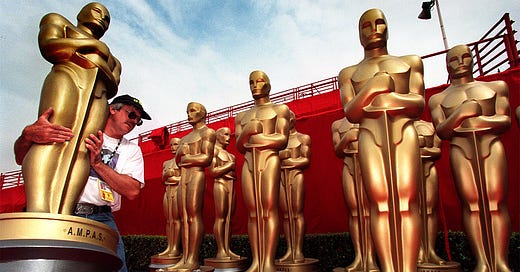The Sinister Origin Story of the Oscars
Hollywood's biggest night began with a rich man trying to cover up his industry's union-busting shadiness.
Let’s get this out of the way: I love the Oscars. I’ve loved them since I was little, though I’ve had a long, winding trajectory toward self-acceptance around this fact. (Sorry, but there’s something vaguely humiliating about caring about awards of any kind.) I love the spectacle, I love criticizing the Oscars, I love believing that they have something meaningful to reflect back to us about culture and society, I love that it’s sports, I love the history, I love it all. It’s Hollywood's BIGGEST NIGHT. I follow the films and the races and the endless coverages leading up to—and following—the annual ceremony. It’s dumb fun and I’ll take as much of that as I can get.
It’s also still true that the Oscars kind of suck for about a million different reasons. The movie business is perhaps the very last business on the planet that needs an event to celebrate itself; the awards are rarely representative of the actual best movies of the year; the show is often middling at best; and the Academy has a bad history of exclusion and shameful proceedings. To truly love the Academy Awards is to have a deep awareness of their failings and keep coming back anyway. And one of the show’s biggest failings actually rests in its founding principle, which originated with movie mastermind Louis B. Mayer.
Mayer is among Hollywood’s most legendary founding fathers—he’s the Mayer in Metro-Goldwyn-Mayer, aka MGM. He co-founded and ran MGM for decades, and had a seismic influence in the fledgling days of the industry. Even knowing all that, the precise journey that led to the creation of the Academy Awards is fairly astonishing in its motivations and function as a sheer business mechanism.
The story begins with Mayer, a rich but ungenerous man, wanting to cut corners on the construction of his beach house.
Keep reading with a 7-day free trial
Subscribe to Discourse Blog to keep reading this post and get 7 days of free access to the full post archives.





